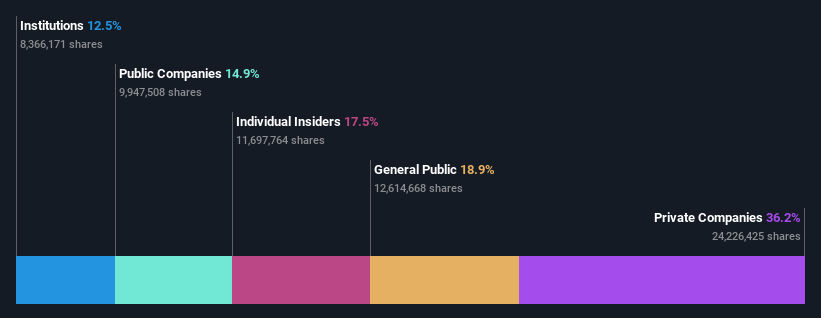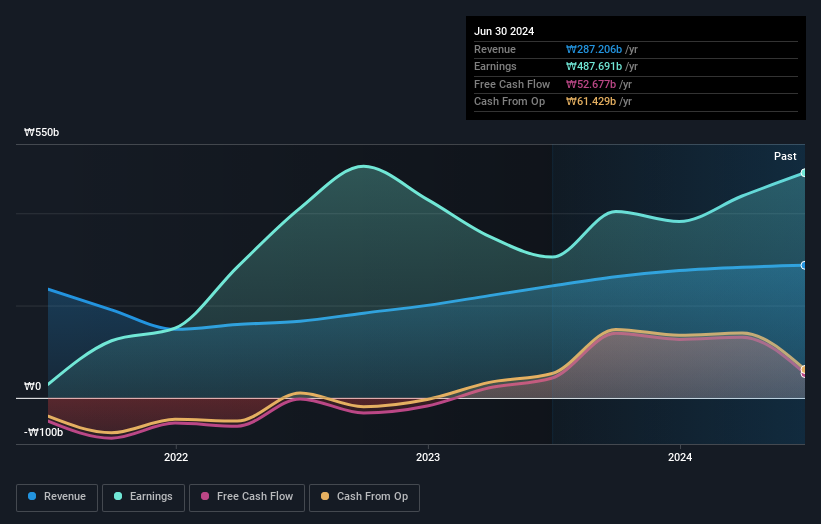- South Korea
- /
- Hospitality
- /
- KOSE:A180640
Private companies among Hanjin Kal's (KRX:180640) largest shareholders, saw gain in holdings value after stock jumped 11% last week

Key Insights
- The considerable ownership by private companies in Hanjin Kal indicates that they collectively have a greater say in management and business strategy
- 55% of the business is held by the top 5 shareholders
- Insider ownership in Hanjin Kal is 17%
To get a sense of who is truly in control of Hanjin Kal (KRX:180640), it is important to understand the ownership structure of the business. The group holding the most number of shares in the company, around 36% to be precise, is private companies. In other words, the group stands to gain the most (or lose the most) from their investment into the company.
Clearly, private companies benefitted the most after the company's market cap rose by ₩622b last week.
Let's take a closer look to see what the different types of shareholders can tell us about Hanjin Kal.
Check out our latest analysis for Hanjin Kal

What Does The Institutional Ownership Tell Us About Hanjin Kal?
Institutions typically measure themselves against a benchmark when reporting to their own investors, so they often become more enthusiastic about a stock once it's included in a major index. We would expect most companies to have some institutions on the register, especially if they are growing.
As you can see, institutional investors have a fair amount of stake in Hanjin Kal. This implies the analysts working for those institutions have looked at the stock and they like it. But just like anyone else, they could be wrong. If multiple institutions change their view on a stock at the same time, you could see the share price drop fast. It's therefore worth looking at Hanjin Kal's earnings history below. Of course, the future is what really matters.

Hanjin Kal is not owned by hedge funds. Hoban Construction Industry Co., Ltd. is currently the largest shareholder, with 18% of shares outstanding. Meanwhile, the second and third largest shareholders, hold 15% and 11%, of the shares outstanding, respectively. Furthermore, CEO Won-Tae Cho is the owner of 6.0% of the company's shares.
Our research also brought to light the fact that roughly 55% of the company is controlled by the top 5 shareholders suggesting that these owners wield significant influence on the business.
While studying institutional ownership for a company can add value to your research, it is also a good practice to research analyst recommendations to get a deeper understand of a stock's expected performance. As far as we can tell there isn't analyst coverage of the company, so it is probably flying under the radar.
Insider Ownership Of Hanjin Kal
The definition of company insiders can be subjective and does vary between jurisdictions. Our data reflects individual insiders, capturing board members at the very least. The company management answer to the board and the latter should represent the interests of shareholders. Notably, sometimes top-level managers are on the board themselves.
Most consider insider ownership a positive because it can indicate the board is well aligned with other shareholders. However, on some occasions too much power is concentrated within this group.
Our most recent data indicates that insiders own a reasonable proportion of Hanjin Kal. It has a market capitalization of just ₩6.1t, and insiders have ₩1.1t worth of shares in their own names. That's quite significant. It is good to see this level of investment. You can check here to see if those insiders have been buying recently.
General Public Ownership
With a 19% ownership, the general public, mostly comprising of individual investors, have some degree of sway over Hanjin Kal. This size of ownership, while considerable, may not be enough to change company policy if the decision is not in sync with other large shareholders.
Private Company Ownership
It seems that Private Companies own 36%, of the Hanjin Kal stock. It might be worth looking deeper into this. If related parties, such as insiders, have an interest in one of these private companies, that should be disclosed in the annual report. Private companies may also have a strategic interest in the company.
Public Company Ownership
It appears to us that public companies own 15% of Hanjin Kal. We can't be certain but it is quite possible this is a strategic stake. The businesses may be similar, or work together.
Next Steps:
It's always worth thinking about the different groups who own shares in a company. But to understand Hanjin Kal better, we need to consider many other factors. For instance, we've identified 1 warning sign for Hanjin Kal that you should be aware of.
Of course this may not be the best stock to buy. So take a peek at this free free list of interesting companies.
NB: Figures in this article are calculated using data from the last twelve months, which refer to the 12-month period ending on the last date of the month the financial statement is dated. This may not be consistent with full year annual report figures.
Valuation is complex, but we're here to simplify it.
Discover if Hanjin Kal might be undervalued or overvalued with our detailed analysis, featuring fair value estimates, potential risks, dividends, insider trades, and its financial condition.
Access Free AnalysisHave feedback on this article? Concerned about the content? Get in touch with us directly. Alternatively, email editorial-team (at) simplywallst.com.
This article by Simply Wall St is general in nature. We provide commentary based on historical data and analyst forecasts only using an unbiased methodology and our articles are not intended to be financial advice. It does not constitute a recommendation to buy or sell any stock, and does not take account of your objectives, or your financial situation. We aim to bring you long-term focused analysis driven by fundamental data. Note that our analysis may not factor in the latest price-sensitive company announcements or qualitative material. Simply Wall St has no position in any stocks mentioned.
About KOSE:A180640
Mediocre balance sheet with questionable track record.


